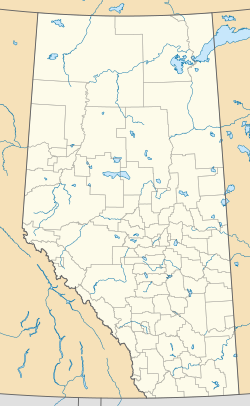Hughenden /hjuːˈɛndən/ is a village in central Alberta, Canada. It is located 49 km south of Wainwright, in the Municipal District of Provost No. 52, along Highway 13.
Hughenden | |
|---|---|
| Village of Hughenden | |
| Coordinates: 52°30′39″N 110°58′11″W / 52.51083°N 110.96972°W | |
| Country | Canada |
| Province | Alberta |
| Region | Central Alberta |
| Census Division | No. 7 |
| Municipal district | Municipal District of Provost No. 52 |
| Incorporated[1] | |
| • Village | December 27, 1917 |
| Government | |
| • Mayor | Shelby Gill |
| • Governing body | Hughenden Village Council |
| Area (2021)[3] | |
| • Land | 0.78 km2 (0.30 sq mi) |
| Elevation | 690 m (2,260 ft) |
| Population (2021)[3] | |
• Total | 213 |
| • Density | 272.5/km2 (706/sq mi) |
| Time zone | UTC−7 (MST) |
| • Summer (DST) | UTC−6 (MDT) |
| Highways | 13 |
| Website | Official website |
The community takes its name from the Hughenden Manor, home of Benjamin Disraeli.[4]
Demographics
editIn the 2021 Census of Population conducted by Statistics Canada, the Village of Hughenden had a population of 213 living in 97 of its 112 total private dwellings, a change of -12.3% from its 2016 population of 243. With a land area of 0.78 km2 (0.30 sq mi), it had a population density of 273.1/km2 (707.3/sq mi) in 2021.[3]
In the 2016 Census of Population conducted by Statistics Canada, the Village of Hughenden recorded a population of 243 living in 101 of its 117 total private dwellings, a 5.7% change from its 2011 population of 230. With a land area of 0.78 km2 (0.30 sq mi), it had a population density of 311.5/km2 (806.9/sq mi) in 2016.[5]
The Village of Hughenden's 2012 municipal census counted a population of 258,[6] a 0.3% decrease over its 2008 municipal census population of 266.[7]
See also
editReferences
edit- ^ "Location and History Profile: Village of Hughenden" (PDF). Alberta Municipal Affairs. October 21, 2016. p. 379. Retrieved October 23, 2016.
- ^ "Municipal Officials Search". Alberta Municipal Affairs. May 9, 2019. Retrieved October 1, 2021.
- ^ a b c "Population and dwelling counts: Canada, provinces and territories, and census subdivisions (municipalities)". Statistics Canada. February 9, 2022. Retrieved February 9, 2022.
- ^ Place-names of Alberta. Ottawa: Geographic Board of Canada. 1928. p. 66.
- ^ "Population and dwelling counts, for Canada, provinces and territories, and census subdivisions (municipalities), 2016 and 2011 censuses – 100% data (Alberta)". Statistics Canada. February 8, 2017. Retrieved February 8, 2017.
- ^ "2012 Municipal Affairs Population List" (PDF). Alberta Municipal Affairs. 2012-11-22. Retrieved 2012-12-14.
- ^ "Alberta 2009 Official Population List" (PDF). Alberta Municipal Affairs. 2009-09-15. Retrieved 2010-09-14.
